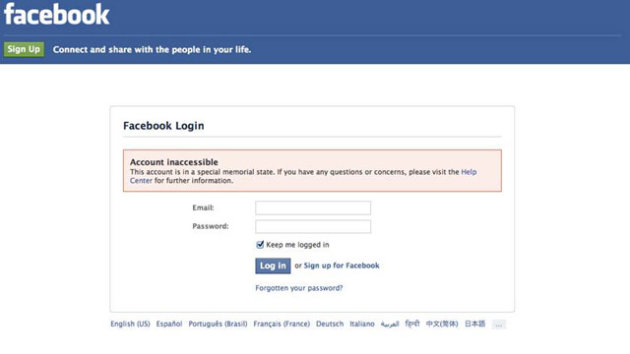Rusty Foster discovered he was dead last week, at least according to Facebook. He had been locked out of his account, which had been turned into a "memorial page," because someone had reported the Maine man as deceased to the social media site.
He tweeted Thursday, "Facebook thinks I'm dead. I'm tempted to just let it," then "Did you know that you can report any of your Facebook friends dead & Facebook will lock them out of their account with no evidence needed?"
As one of Foster's friends discovered, it doesn't take much to convince Facebook that somebody is dead. By simply going to the " Memorialization Request" page and filling out a form, including a link to an obituary, anybody can take someone else off Facebook.
The obituary needs to have the same name (or at least a close name), but doesn't need to match any other details on the profile. The obituary Foster's friend used to prove Foster's death was for a man who was born in 1924 and died in 2011 in a different state than the one Foster lists on Facebook as his home state.
Foster, 36, said he never got any notification his account was going to be locked, and only discovered it when he attempted to log in. He filled out a form to report the error, and received a response that began with "We are very sorry to hear about your loss."
More than a full day later, Foster's account still hadn't been unlocked. Buzzfeed, tipped off by Foster,posted an article in which one editor "killed" another editor, John Herrman, on Facebook. According to the article, about an hour after Herrman reported the error to Facebook, his profile was reactivated. About an hour after that, 27 hours after Foster first reported his erroneous death, he was "resurrected" by Facebook and allowed back into his account.
Foster does not know the total amount of time he was "Facebook dead." He told ABC that nothing was different with his account when he logged back in, only that some of his friends had a little fun with his status.
"The only thing that happened was some of my friends posted little mock-eulogies for me, because word got around that I was locked out, due to a temporary case of death," Foster wrote in an email with the subject line, "Rusty, the Facebook zombie."
When pages are memorialized, they are removed from sidebars, timelines and friend suggestions and searches. This is likely to prevent people from seeing their friends who have died pop up on their newsfeed, and to prevent people from hacking into the accounts of dead people.
Foster said he understands the position Facebook is in when it comes to the death of one of its users, but believes there are better options for the social media site.
"There ought to be an email sent to the account's email address informing it that the account has been reported dead and providing a link or something to dispute the report before any action is taken," Foster wrote.
Foster said the most frustrating part was not being able to get into his account to "click the 'I'm not dead' button that should also be there."
This has apparently been the same "memorialization" process since at least 2009, when another user took to his personal blog to write about his experience of being "Facebook dead." In his case, the obituary his friend used to have him declared dead wasn't even close to his real name. Instead, the man who performed the funeral services had a similar name.
In a statement to ABC News, Facebook said the system is in place in order to respect the privacy of the deceased.
"We have designed the memorialization process to be effective for grieving families and friends, while still providing precautions to protect against either erroneous or malicious efforts to memorialize the account of someone who is not deceased," the statement reads. "We also provide an appeals process for the rare instances in which accounts are mistakenly reported or inadvertently memorialized."

